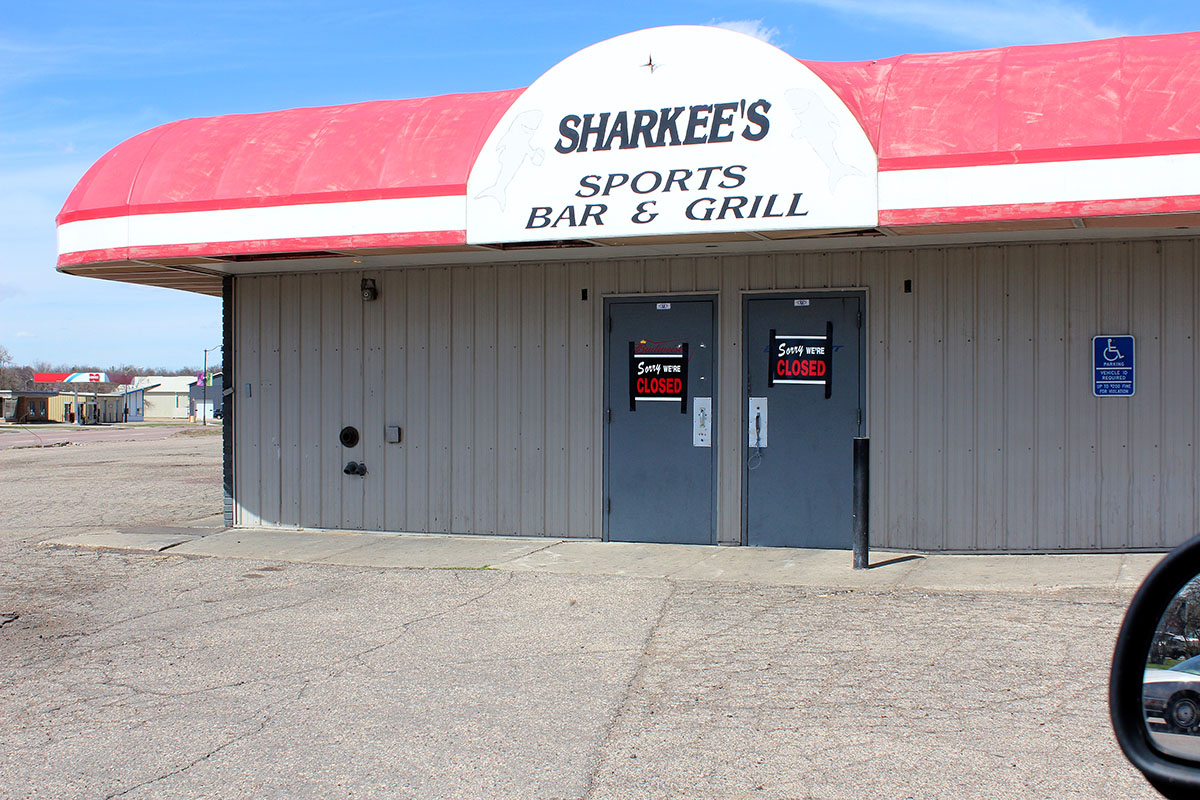
Sharkee’s owner Dave Halverson has agreed to sell his condemned property on Highway 75 to the city of Luverne for $220,000.
The agreement comes after city officials initiated the process of acquiring the structure and lot through eminent domain.
The abandoned building — once a bar and restaurant — has for two years been in violation of health department and city codes and is considered a public nuisance and a hazard.
Councilwoman Esther Frakes said eminent domain is never the preferred method for addressing blight, but she said it was the only tool at the city’s disposal in this case.
“In all my years on the council, this is the one thing that I got the most comments about,” she said. “People wanted to know when we were going to do something about Sharkee’s.”
As part of the eminent domain process, the city ordered commercial appraisals, which arrived at an estimated value of $135,000 on the bare lot. This price factored in the demolition costs that would have been incurred.
That amount is based on three other Highway 75 properties — GrandStay, Herman Motors and Kozlowski — that had been redeveloped after demolition.
Mayor Pat Baustian said the city offered Halverson more than the appraised value in order to avoid increased legal costs that would be incurred with the condemnation process.
He explained that Halverson could order his own appraisal, and if it’s not within a certain percentage of what was offered for the property, the city could be liable for all legal fees associated with the sale.
“The council gave city staff marching orders to offer a bit more to have it wrapped up and done,” Baustian said.
He also said it’s important to focus on the property’s potential value, not the eyesore that it is today.
“It’s a huge highway frontage lot,” Baustian said.
Sharkee’s and the Mert’s Repair property are both part of a tax increment financing district. The city purchased Mert’s Repair lot for $160,000 to the east of Sharkee’s and sold Marlin Kracht a new lot in the Industrial Park (for $10,000) for his expansion.
The costs for acquisition and demolition of both lots — a total of four acres — will be recouped in the TIF amount, $600,000.
What that means is whoever buys the bare lot will pay full taxes on the improved property, but the difference between the current tax amount and the new tax amount will pay down the $600,000 TIF debt.
After the TIF expires in 25 years, local governments will benefit from taxes paid on the full value of the developed lots.
Baustian said the city’s immediate goal is to demolish the Sharkee’s and Mert’s Repair buildings and prepare the bare lot for future development.
In particular, city planners have specified that they would prefer to have a general mix of retail and possibly a mixed use residential development.
Baustian said there have been several inquiries, but the city is not in negotiation with a particular developer at this time.
According to the purchase agreement, which will be finalized at the Dec. 13 City Council meeting, Halverson has until Jan. 31 to remove belongings from the Sharkee’s building.
China Inn building not part of Sharkee’s-Mert’s TIF
According to Baustian the China Inn property owner, who lives in Mankato, is not part of the current TIF arrangement with Mert’s and Sharkee’s.
But he did say that it’s possible the China Inn owner may have been approached by a possible developer about the restaurant being part of a new structure.
“If anything is happening with China Inn, we’re not part of those discussions,” Baustian said.
Sharkee’s background
In April of 2014 Sharkee’s closed due to health code violations, mainly basement sewage backup, and on May 26, 2014, the building suffered damage from a fire reportedly set by arsonists.
The arson remains under investigation but is essentially a cold case.
Halverson’s insurance carrier, Auto Owners, denied payment on the fire claim, alleging that “someone close to” Halverson — a former employee — had been implicated in the arson.
That individual had been questioned and no criminal charges were filed, so Halverson sued his insurance company several months ago, and that legal action was recently settled.


